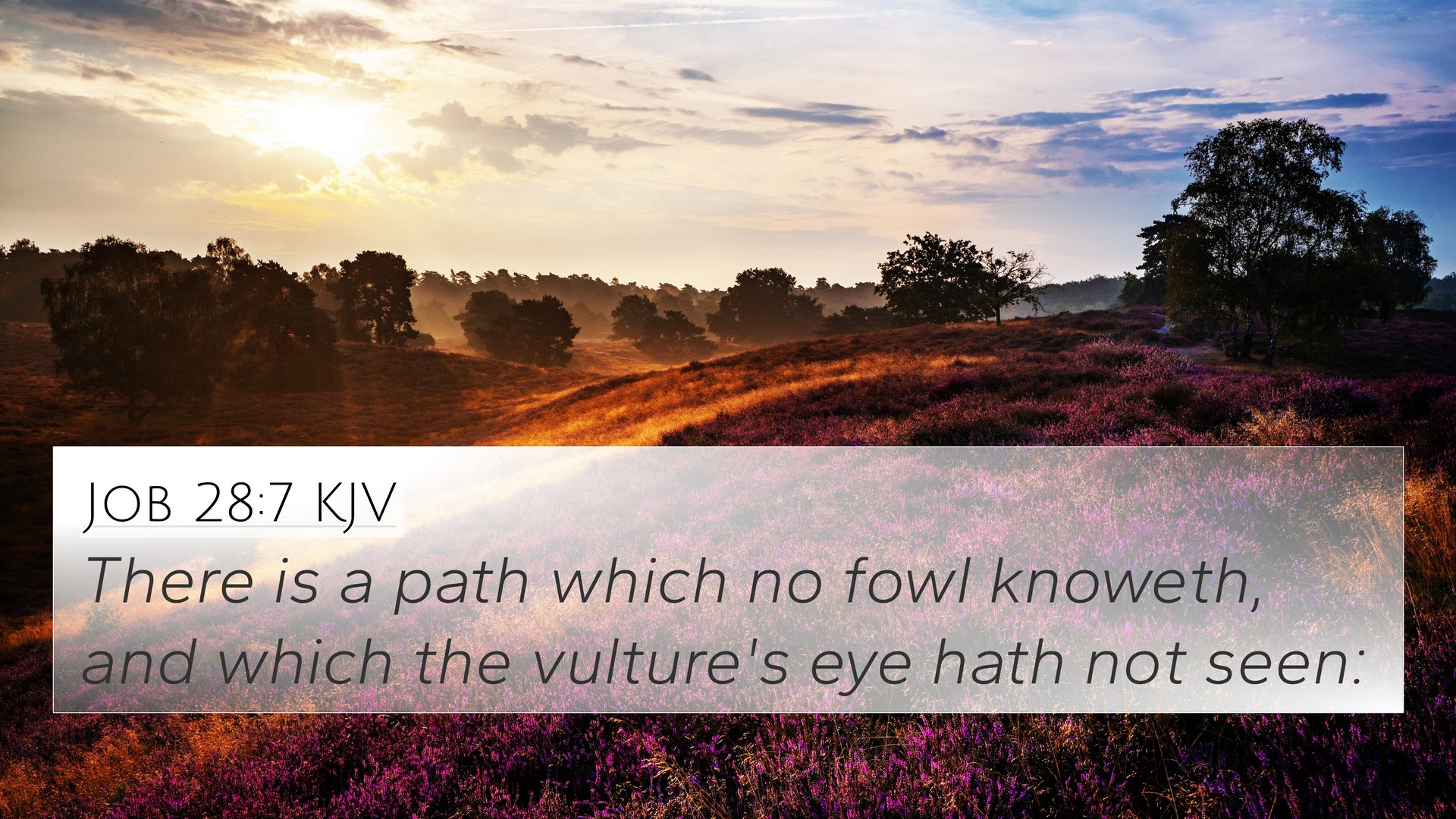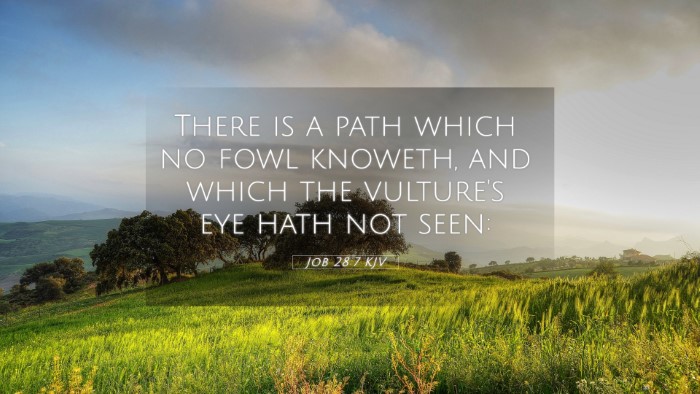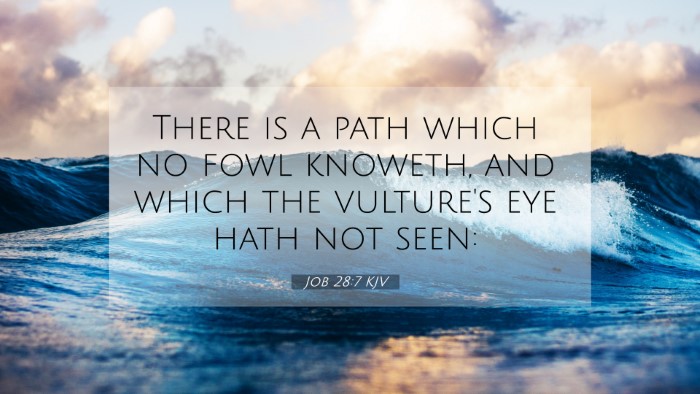Old Testament
Genesis Exodus Leviticus Numbers Deuteronomy Joshua Judges Ruth 1 Samuel 2 Samuel 1 Kings 2 Kings 1 Chronicles 2 Chronicles Ezra Nehemiah Esther Job Psalms Proverbs Ecclesiastes Song of Solomon Isaiah Jeremiah Lamentations Ezekiel Daniel Hosea Joel Amos Obadiah Jonah Micah Nahum Habakkuk Zephaniah Haggai Zechariah MalachiJob 28:7 Similar Verses
Job 28:7 Cross References
There is a path which no fowl knoweth, and which the vulture's eye hath not seen:
Uncover the Rich Themes and Topics of This Bible Verse
Listed below are the Bible themes associated with Job 28:7. We invite you to explore each theme to gain deeper insights into the Scriptures.
Job 28:7 Cross Reference Verses
This section features a detailed cross-reference designed to enrich your understanding of the Scriptures. Below, you will find carefully selected verses that echo the themes and teachings related to Job 28:7 KJV. Click on any image to explore detailed analyses of related Bible verses and uncover deeper theological insights.
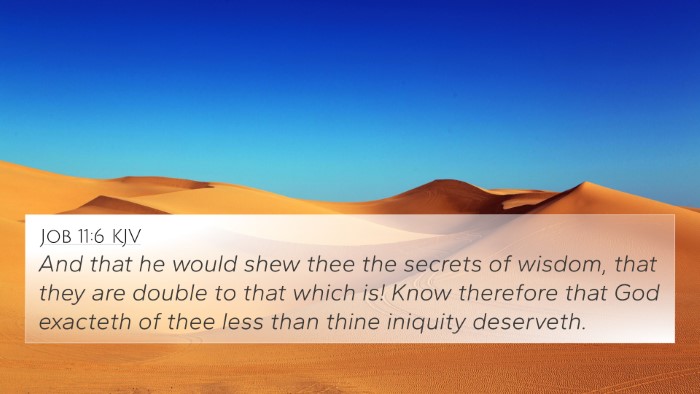
Job 11:6 (KJV) »
And that he would shew thee the secrets of wisdom, that they are double to that which is! Know therefore that God exacteth of thee less than thine iniquity deserveth.
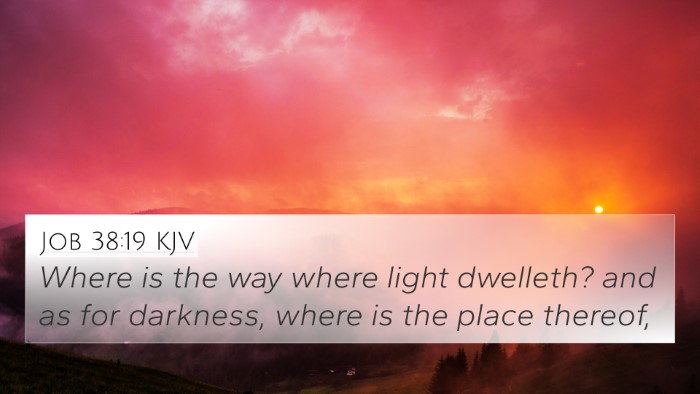
Job 38:19 (KJV) »
Where is the way where light dwelleth? and as for darkness, where is the place thereof,

Job 28:21 (KJV) »
Seeing it is hid from the eyes of all living, and kept close from the fowls of the air.
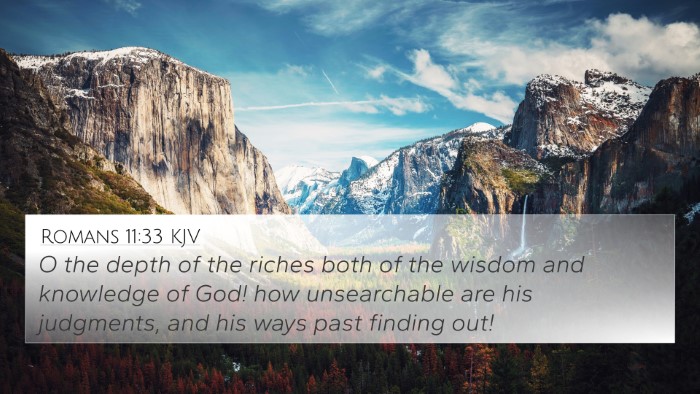
Romans 11:33 (KJV) »
O the depth of the riches both of the wisdom and knowledge of God! how unsearchable are his judgments, and his ways past finding out!
Job 28:7 Verse Analysis and Similar Verses
Understanding Job 28:7
Job 28:7 states: "There is a path which no fowl knoweth, and which the vulture's eye hath not seen." This verse within the broader context of Job's discourse on wisdom speaks to the enigmatic nature of divine knowledge.
Verse Meaning and Interpretation
This verse serves as a metaphorical acknowledgment of the depths of wisdom that are hidden and inaccessible to creatures of physical understanding. Commentators highlight several key insights:
- Matthew Henry: He emphasizes that true wisdom is beyond human comprehension and cannot be grasped by mere observation, likening it to deep mines that provide precious things that are not easily reached.
- Albert Barnes: Barnes elaborates that the paths of wisdom are invisible to the natural world, suggesting a divine order that ordinary eyes cannot perceive.
- Adam Clarke: Clarke points out the mystery of wisdom, indicating that it is found in realms beyond human experience and is often misunderstood or unrecognized by those who seek it through traditional means.
Thematic Connections
The themes of wisdom and divine understanding in Job 28:7 can be cross-referenced with several other Bible verses to enrich our understanding and demonstrate the interconnectedness of scripture. Here are some key cross-references:
- Proverbs 2:6: "For the Lord gives wisdom; from his mouth come knowledge and understanding." - Affirms that true wisdom is a gift from God.
- Job 12:13: "With God is wisdom and strength; he hath counsel and understanding." - Highlights God's role as the ultimate source of wisdom.
- 1 Corinthians 1:25: "Because the foolishness of God is wiser than men; and the weakness of God is stronger than men." - Illustrates the superiority of divine wisdom over human intellect.
- Isaiah 40:13: "Who hath directed the Spirit of the Lord, or being his counsel hath taught him?" - Questions human ability to comprehend divine wisdom.
- Colossians 2:3: "In whom are hid all the treasures of wisdom and knowledge." - Stresses that wisdom is not found in earthly pursuits but in Christ.
- Psalm 147:5: "Great is our Lord, and of great power: his understanding is infinite." - Exalts the limitless nature of God's understanding.
- Ecclesiastes 7:23: "All this have I proved by wisdom: I said, I will be wise; but it was far from me." - Reflects the struggle to attain wisdom on human terms.
Connections Between Job 28:7 and Other Scriptures
The profound implications of Job 28:7 foster a comparative analysis of wisdom throughout the Bible. Below are insights into how this verse interacts with broader scriptural themes:
- Theological Understanding: The essence of Job's message aligns with the theological assertion that wisdom is synonymous with a relationship with God, explored throughout the Proverbs.
- Human Limitation: The mention of the vulture signifies limitations in human understanding, reminiscent of how prophets like Isaiah portrayed God's knowledge as beyond human experience.
- Divine Revelation: The hidden paths of wisdom highlight the necessity for divine revelation in understanding spiritual truths, a theme that resonates in the New Testament's teachings about faith.
- Exploration of Knowledge: Job’s rhetorical questions about wisdom urge the reader to seek divine knowledge rather than relying solely on worldly wisdom.
- Philosophical Reflection: The verse invites philosophical reflection on existential themes found in both the Old and New Testaments regarding the nature of reality and truth.
Practical Application and Study Tools
For those wishing to delve deeper into scripture and explore the connections between Bible verses, consider the following tools:
- Bible Concordance: A valuable resource for locating verses related to specific themes, offering insights and cross-references.
- Bible Cross-Reference Guide: Use guides to identify links between verses across different books of the Bible.
- Study Methods: Engage in cross-referencing Bible study methods to uncover thematic connections and enhance your understanding of scripture.
- Bible Reference Resources: These materials help readers connect verses, drawing out the coherence of biblical themes.
- Bible Chain References: Explore chains of related passages to build a comprehensive understanding of concepts like wisdom and knowledge.
Conclusion
In conclusion, Job 28:7 serves as a crucial verse in understanding the nature of divine wisdom found within the Bible. Through cross-referencing various scriptures, we gain a richer revelation of what true wisdom entails and how it connects to our lives today. As we study this verse and its related texts, we are encouraged to seek wisdom from God, recognizing that it is often found in paths that we do not see.
Exploration of Related Questions
As you explore Job 28:7, consider these reflective questions to deepen your study:
- What verses are related to Job 28:7, and how do they enhance its meaning?
- How do the themes of wisdom in Job interact with those found in the New Testament?
- In what ways does the understanding of wisdom differ between the Old and New Testaments?
- What lessons about the pursuit of knowledge can be gleaned from Job 28:7?
